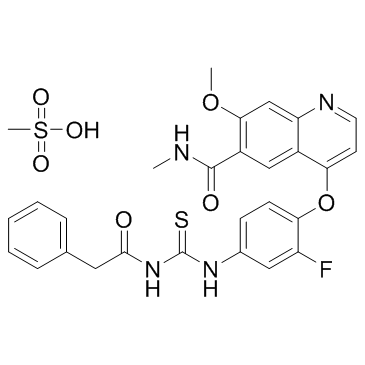| Description |
TAS-115 mesylate is a potent vascular endothelial growth factor (VEGFR) and hepatocyte growth factor receptor (c-Met/HGFR)-targeted kinase inhibitor, with IC50s of 30 and 32 nM for rVEGFR2 and rMET, respectively.
|
| Related Catalog |
|
| Target |
IC50: 30 nM (rVEGFR2), 32 nM (rMET)[1]
|
| In Vitro |
TAS-115 powerfully suppresses the VEGF-dependent proliferation of HUVECs (IC50=0.019 μM) as a VEGFR-targeted inhibitor and powerfully suppresses the proliferation of MET-amplified cancer cells (GI50=0.032-0.362 μM) as a MET-targeted inhibitor. TAS-115 has much less toxicity in various normal cell lines when compared with other VEGFR-targeted kinase inhibitors[1]. Crizotinib and TAS-115 inhibit Met phosphorylation and reverse erlotinib resistance and VEGF production triggered by HGF in PC-9 and HCC827 cells[2].
|
| In Vivo |
TAS-115 completely suppresses the progression of MET-inactivated tumor by blocking angiogenesis without toxicity when given every day for 6 weeks, even at a serum-saturating dose of TAS-115. TAS-115 induces marked tumor shrinkage and prolonges survival in MET-amplified human cancer–bearing mice[1].
|
| Cell Assay |
Tumor cells (8000 cells/800 mL) with or without TAS-115 (1.0 μM) or erlotinib (0.3 μM) in the lower Transwell collagen–coated chambers are cocultured with MRC-5 (1000 cells/300 μL) cells in the upper chamber for 72 hours. The upper chamber is then removed. Cell viability is measured using the MTT assay[2].
|
| Animal Admin |
Mice[1] The TAS-115 dose levels are set at 12.5, 50, and 200 mg/kg/d. The dose level for sunitinib is set at 40 mg/kg/d. Oral drug treatment is continued for 14 or 42 consecutive days for the chronic dosing in the SC-9 xenograft model. During the treatment period, TV and body weight are measured twice per week. The antitumor efficacy is assessed at the end of each study period[1].
|
| References |
[1]. Fujita H, et al. The novel VEGF receptor/MET-targeted kinase inhibitor TAS-115 has marked in vivo antitumor properties and a favorable tolerability profile. Mol Cancer Ther. 2013 Dec;12(12):2685-96. [2]. Nakade J, et al. Triple inhibition of EGFR, Met, and VEGF suppresses regrowth of HGF-triggered, erlotinib-resistant lung cancer harboring an EGFR mutation. J Thorac Oncol. 2014 Jun;9(6):775-83.
|
